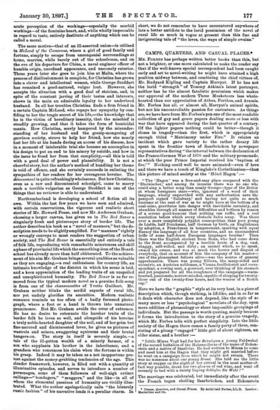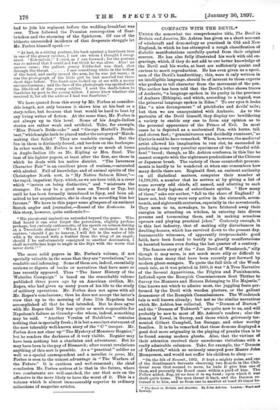CAMPS, QUARTERS, AND CASUAL PLACES.* Mn. FoanEs has perhaps written
better books than this, but not a brighter, or one more calculated to make the reader say that if the well-known special correspondent had been caught early and set to novel-writing he might have attained a high position midway between, and combining the chief virtues of, Mr. Rudyard Kipling and Captain Marryat. If he has not the lurid " strength " of Tommy Atkins's latest portrayer, neither has he the almost fatalistic pessimism which makes our approval of the modern Three Musketeers less whole- hearted than our appreciation of Athos, Porthos, and Aramis. Mr. Forbes has all, or almost all, Marryat'e animal spirits, but not his uncontrollable passion for caricature. As things are, we have here from Mr. Forbes's pen one of the most readable collection of gay and grave papers dealing more or less with war that have appeared during the last quarter of a century. Of the lighter papers nothing could be better—though it closes in tragedy—than the first, which is appropriately enough titled "Matrimony under Fire." It relates an incident which gave variety to the rather dreary life spent in the frontier town of Saarbriicken by newspaper representatives during "the interval between the declaration of the Franco-German War of 1870 and the military promenade, at which the poor Prince Imperial received his baptism of fire.'" Nothing could well be more animated—even if here and there we have a touch of Kinglake's Corinthianism—than this picture of mixed society at the Hotel Hagen' :—
"The 'Hagen' was a free-and-easy place compared with the Rheinischer,' and among its inmates there was no one whc could sing a better song than manly George—type of the Briton at whom foreigners stare—who, ignorant of a word of theii language, wholly unprovided with any authorisation save the. passport signed Salisbury,' and having not quite so much business at the seat of war as he might have at the bottom of a coal-mine, gravitates into danger with inevitable certainty, and stumbles through all manner of difficulties and bothers by reason of a serene good-humour that nothing can ruffle, and a cool resolution before which every obstacle fades away. Was there ever a more completely polyglot cosmopolitan than poor young de Liefde, half Dutchman, half German by birth, an Englishman by adoption, a Frenchman in temperament, speaking with equal fluency the language of all four countries, and an unconsidered trifle of some half-dozen European languages besides ? Then there was the English student from Bonn, who had come down to the front accompanied by a terrible brute of a dog, vast, shaggy, self-willed, and dirty ; an animal which, so to speak, owned his owner, and was so much the horror and disgust of everybody, that on account of him the company of his master— one of the pleasantest fellows alive—was the source of general apprehension. There was young Silbera, the many-sided and eccentric, an Austrian nobleman, a Vienna feuilletonist and corre- spondent, a rowing man, a gourmet, ever thinking of his stomach and yet prepared for all the roughness of the campaign—warm- hearted, passionate, narrow-minded, capable of sleeping for twenty- three out of the twenty-four hours, and the wearer of a Scotch cap."
Here we have the " graphic " style at its very best, in a piece of description which, though striking, is lifelike, and in so far as it deals with character does not depend, like the style of so many more or less " psychological " novelists of the day, upon mere oddities of phraseology or sheer impossible groupings of individuals. But the passage is worth quoting, mainly because it forms the introduction to the story of a genuine tragedy, which Mr. Forbes tells with perfect simplicity. Into the little society of the Hagen there comes a family party of three, con- sisting of a plump " engaged " little girl of about eighteen, an elder sister, and a brother :—
"Little Minna Vogt had for her Brdutigam a young Feldwebel of the second battalion of the Hobenzollerns of the name of Ecken- stein and a native of Saarldius. He had written to Minna to come and meet him at the Hagen that they might get married before he went on a campaign from which he might not return. There was no nonsense about our young Braut. She told me the little story at supper on the night of her arrival in the most matter-of- fact way possible, drank her two glasses of red wine, and went off serenely to bed with a dainty lisping Schtafen Sie !"
The marriage was celebrated, but immediately after the event the French began shelling Saarbrileken, and Eckenstein
• Camps, Quarters, and Casual Num By AroliVsald Forbes, LLD. London : Macmillan and Co.
had to join his regiment before the wedding-breakfast was aver. Then followed the Prussian reoccupation of Saar- briicken and the storming of the Spicheren. Of one of the hitherto unrecorded incidents of that desperate struggle let Mr. Forbes himself speak :—
" At last, in a sitting posture, his back against a hawthorn tree in one of the grassy ravines, I saw one whom I thought I recog- nised. ' Eckenstein !' I cried, as I ran forward; for the posture was so natural that I could not but think he was alive. Alas! no answer came ; the gallant young Feldwebel was dead, shot
through the throat I saw something white in the hollow of the hand, and easily moved the arm, for he was yet warm ; it was the photograph of the little girl he had married but three short days before. The frank eyes looked up at me with a merry unconsciousness ; and the face of the photograph was spotted with the life-blood of the young soldier. I sent the death-token to Saarlolus by post to the young widow. I never knew whether she received it, for all the address I had was SaarloIus."
We have quoted from this story by Mr. Forbes at consider- able length, not only because it shows him at his best as a story-teller, but because that best would be bard to beat by
any living writer of fiction. At the same time, Mr. Forbes is not always up to this level. Some of his Anglo-Indian stories are rather weak and artificial. Take, for example, "Miss Priest's Bride-cake" and " George Martell's Baudo- bast," which might both be placed under the category of "Match- making that failed." They are readable enough. But the fun in them is distinctly forced, and borders on the burlesque. In other words, Mr. Forbes is not nearly so much at home in Anglo-Indian life as Mr. Kipling or Mrs. Steel. The best of his lighter papers, at least after the first, are those in which he deals with his native district. "The Inverness
Character Fair" is an excellent piece of realism,—saturated with alcohol. Fall of knowledge, and of animal spirits of the Christopher North sort, is "My Native Salmon River,"—
the rapid, impatient Spey, which, as we are here told, is a river which "insists on being distinctive," and "mistrusts the stranger. He may be a good man on Tweed or Tay, but until he has been formally introduced to Spey, and been ad- mitted to her acquaintance, she is chary in according him her favours." We have in this paper some glimpses of an eminent Scotch angler and journalist,—Russel of the Scotsman. Is this story, however, quite authentic ?—
" His piscatorial aspirations extended beyond the grave. Who that heard it can ever forget the peroration, slightly profane perhaps, but entirely enthusiastic, of his speech on salmon-fishing at a Tweedside dinner ? When I die,' he exclaimed in a fine rapture, should I go to heaven, I will fish in the water of life with a fly dressed with a feather from the wing of an angel ; should I be unfortunately consigned to another destination, I shall nevertheless hope to angle in the Styx with the worm that never dieth !'"
The more solid papers in Mr. Forbes's volume, if not specially valuable in the sense that they are "revelations," are readable and informing. Some of them are, indeed, essentially reviews or digests of books or narratives that have more or less recently appeared. Thus "The Inner History of the Waterloo Campaign" is based on the remarkable volume published three years ago by an American civilian, Mr. Ropes, who had given up many years of his life to the study of military operations. Mr. Forbes does not agree with all Mr. Ropes's conclusions ; thus he does not accept the latter's view that up to the morning of June 17th Napoleon had accomplished all that he had intended. But he does agree with Mr. Ropes that Ney was quite as much responsible for Napoleon's failure as Grouchy—for whom, indeed, something may be said. "Another Version of Balaklava " contains nothing that is specially fresh ; it is but a succinct statement of the now tolerably well-known story of the " C " trooper. Mr.
Forbes does not clear up" The Mystery of Monsieur Regnier," but he renders the darkness of it very visible. Regnier may have been nothing but a charlatan and adventurer. But he may have been in the pay of Bismarck; after recent revelations anything of this sort is possible. As a " practical " soldier as well as a special correspondent and a novelist in posse, Mr, Forbes is seen to the utmost advantage in "The Warfare of the Future." It is cautious and well-reasoned ; the chief conclusion Mr. Forbes arrives at is that in the future, where two combatants are well-matched, the one that acts on the offensive is the more likely to have the worst of it. This is a volume which is almost immeasurably superior to ordinary collections of magazine articles.



















































 Previous page
Previous page